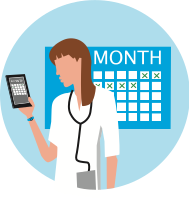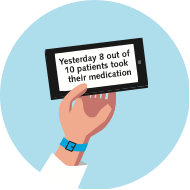Rethinking optimal care for TB
Historically, the most widely-implemented means of supporting people affected by TB on treatment is Directly Observed Treatment (DOT) where a healthcare worker watches the medication being taken, either at a healthcare facility or at the person’s home. The DOT approach has advanced global decline in TB incidence. However, innovations are needed to improve person-centered care, enable a more efficient health care system and empower people affected by TB and health care workers so that a greater impact in curing and preventing all types of TB can be achieved.
Challenges experienced by people living with TB with the current DOT approach:
Provider challenges with the current DOT approach:
The ASCENT project helps people affected by TB successfully complete their course of treatment through the use of digital adherence technologies and data-driven support interventions, utilizing tools such as smart pill boxes and other innovations.
These digital adherence technologies empower their users to take their daily medication at a time and place that suits them best. Additionally they provide real-time information to the TB doctor or nurse, helping to determine the most appropriate treatment approach for each individual person and by enabling focused efforts on those persons that require extra support.
At this moment, these technologies are only used on a small scale in the international fight against TB. The ASCENT project aims to make them accessible to all people living with TB worldwide.
Potential benefits for people affected by TB:
Potential provider benefits:


The ASCENT project is implemented in: